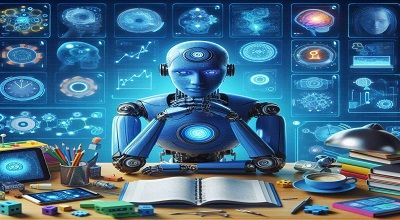AI Tools for Education
10 Best Educational AI tools are software and applications that use artificial intelligence to assist, enhance, or streamline the teaching and learning processes. They can offer various benefits, such as personalized learning, instant feedback, productivity enhancements, interactive learning, data-driven insights, accessibility, and inclusivity. There are many ways to help educational AI tools, depending on your role and interest.
Some examples of educational AI tools are:
- Gradescope: An AI tool that enables students to assess each other while providing feedback, and makes grading easier and faster for teachers.
- Fetchy: A generative AI platform that simplifies and streamlines various tasks for educators. Such as creating engaging lessons, newsletters, emails, and more.
- Nuance’s Dragon Speech Recognition: A speech recognition software that can transcribe up to 160 words per minute. Helping students who find it difficult to write or type.
- Adaptive Learning Platforms: AI-powered platforms that create personalized educational journeys for each student. Based on their learning styles, preferences, and goals.
- Virtual Tutoring Systems: AI-powered systems that provide 24/7 support and personalized guidance for students. Using natural language processing and chatbots.
- AI-Powered Homework Assistant: An AI tool that fosters independent problem-solving skills for students. By providing hints, feedback, and explanations for homework problems.
- Educational Chatbots: AI-powered chatbots that enhance communication and interactivity for students and teachers. By answering questions, providing reminders, and facilitating discussions.
- Gamified Learning Applications: AI-powered applications that use game elements. Rewards to motivate and engage students in learning.
- Smart Study Aids: AI-powered tools that help students study more effectively. Creating flashcards, quizzes, summaries, and notes from various sources.
- Augmented Reality in Education: AI-powered tools that create immersive and interactive learning experiences for students. Overlaying digital information onto the physical world.
Here are some possible suggestions:
- If you are a student, you can help by using the AI tools that suit your learning needs and goals. Providing feedback and ratings, and sharing your experience with others.
- If you are a teacher, you can help by integrating the AI tools into your curriculum, facilitating their use among your students. Collaborating with other educators and researchers to evaluate and improve the AI tools.
- If you are a developer, you can help by creating, testing, and improving AI tools, ensuring they are ethical and transparent. Accessible and engaging with the education community to understand their needs and challenges.
- If you are a policymaker, you can help by supporting the adoption and implementation of AI tools, providing funding and resources, and establishing standards and regulations to ensure quality and equality.
